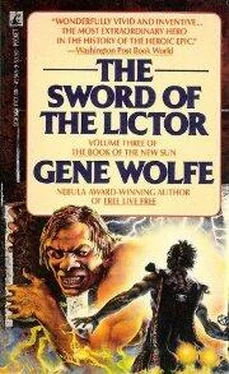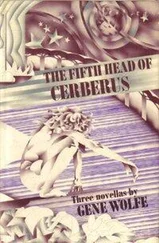Something was in the cell with us. I looked at the barred door and Thecla’s lamp with its silver reflector, then into all the corners. The cell grew darker, and Thecla and even I myself vanished with the light, but the thing that had intruded upon my memory of us did not.
“Who are you,” I asked, “and what do you wish with us?”
“You know well who we are, and we know who you are.” The voice was cool and, I think, perhaps the most authoritative I have ever heard. The Autarch himself did not speak so.
“Who am I, then?”
“Severian of Nessus, the lictor of Thrax.”
“I am Severian of Nessus,” I said. “But I am no longer lictor of Thrax.”
“So you would have us believe.”
There was silence again, and after a time I understood that my interrogator would not question me, but rather would force me, if I desired my freedom, to explain myself to him. I wanted greatly to seize him — he could not have been more than a few cubits away — but I knew that in all likelihood he was armed with the steel talons the guards on the path had shown me. I wanted also, as I had for some time, to draw the Claw from its leathern sack, though nothing could have been more foolish. I said, “The archon of Thrax wished me to kill a certain woman. I freed her instead, and had to flee the city.”
“By magic passing the posts of the soldiers.”
I had always believed all self-proclaimed wonder-workers to be frauds; now something in my interrogator’s voice suggested that even as they attempted to deceive others, so they might deceive themselves. There was mockery in it, but it was mockery of me, not of magic. “Perhaps,” I said. “What do you know of my powers?”
“That they are insufficient to free you from this place.”
“I have not attempted to free myself, and yet I have already been free.”
That disturbed him. “You were not free. You merely brought the woman here in spirit!”
I let my breath out, trying to keep the sigh inaudible. In the antechamber of the House Absolute, a little girl had once mistaken me for a tall woman, when Thecla had for a time displaced my own personality. Now, it seemed, the remembered Thecla must have spoken through my mouth. I said, “Surely I am a necromancer then, who can command the spirits of the dead. For that woman is dead.”
“You told us you freed her.”
“Another woman, who only slightly resembled that one. What have you done to my son?”
“He does not call you his father.”
“He suffers fancies,” I said.
There was no reply. After a time I rose and ran my hands once more over the walls of my underground prison; they were of plain earth, as before. I had seen no light and heard no sound, but it seemed to me that it would have been possible to cover the hatch with some portable structure to exclude the day, and if the hatch were skillfully constructed, it might be lifted silently. I mounted the first rung of the ladder; it creaked beneath my weight.
I climbed a step up, and another, and it creaked at each. I tried to rise to the fourth rung, and felt my scalp and shoulders prodded as though with the points of daggers. A trickle of blood from my right ear wet my neck.
I retreated to the third rung and groped overhead. The thing that had seemed like a torn mat when I entered the underground chamber proved to be a score or more of sharp bamboo splittings, anchored somehow in the shaft with their points directed down. I had descended with ease because my body had forced them to one side; now they prevented me from ascending much as the barbs on a fish spear prevent the fish from getting away. I took hold of one and tried to break it, but though I might have done so with both hands, it was impossible with one. Given light and time I might have worked my way through them; light perhaps I might have had, but I did not dare to take the risk. I jumped to the floor again.
Another circuit of the room told me no more than I had known before, yet it seemed beyond credence that my questioner had climbed the ladder without making a sound, though he might perhaps possess some special knowledge that would permit him to pass through the bamboo. I went about the floor on my hands and knees, and learned no more than before.
I attempted to move the ladder, but it was fixed in position; so beginning at the corner nearest the shaft, I jumped and touched the wall at a point as high as I could reach, then moved half a step to one side and jumped again. When I had arrived at a place that must have been more or less opposite the spot where I had been sitting, I found it: a rectangular hole perhaps a cubit high and two across, with its lower edge slightly higher than my head. My interrogator might have climbed from it silently, perhaps with the aid of a rope, and returned the same way; but it seemed more likely that he had merely thrust his head and shoulders through, so that his voice had sounded as if he were truly in the room with me. I gripped the edge of the hole as well as I could, jumped, and pulled myself up.
THE CHAMBER BEYOND the one in which I had been imprisoned seemed much like it, though its floor was higher. It was, of course, utterly dark; but now that I was confident I was no longer being observed, I took the Claw from its sack and looked about me by its light which was, though not bright, sufficient.
There was no ladder, but a narrow door gave access to what I assumed was a third subterranean room. Concealing the Claw again, I stepped through it, but found myself instead in a tunnel no wider than the doorway, which turned and turned again before I had taken half a dozen strides. At first I supposed it was simply a baffled passage to prevent light from betraying the opening in the wall of the room where I had been confined. But no more than three turns should have been necessary. The walls seemed to bend and divide; yet I remained in impenetrable darkness. I took out the Claw once more.
Perhaps because of the confined space in which I stood, it seemed somewhat brighter; but there was nothing to see beyond what my hands had already told me. I was alone. I stood in a maze with earthen walls and a ceiling (now just above my head) of rough poles; its narrow turnings quickly defeated the light.
I was about to thrust the Claw away again when I detected an odor at once pungent and alien. My nose is by no means the sensitive one of the he-wolf in the tale — if anything, I have rather a poorer sense of smell than most people. I thought I recognized the scent, but it was several moments before I placed it as the one I had experienced in the antechamber on the morning of our escape, when I returned for Jonas after talking to the little girl. She had said that something, some nameless seeker, had been snuffling among the prisoners there; and I had found a viscous substance on the floor and wall where Jonas lay.
I did not put the Claw back in its sack after that; but though I crossed a fetid trail several times as I wandered in the maze. I never glimpsed the creature that left it. After what must have been a watch or more of wandering, I reached a ladder that led up a short, open shaft. The square of daylight at its top was at once blinding and delightful. For a time I basked in it without even setting foot on the ladder. If I were to climb it, it seemed almost certain I would be recaptured at once; and yet I was so hungry and thirsty by then that I could hardly keep myself from doing so, and the thought of the foul thing that sought for me — it was surely one of Hethor’s pets — made me want to bolt up it at once.
At last I climbed cautiously up and thrust my head above the level of the ground. I was not (as I had supposed) in the village I had seen; the windings of the maze had carried me beyond it to some secret exit. The great, silent trees stood closer here, and the light that had appeared so brilliant to me was the filtered green shade of their leaves. I emerged and found that I had left a hole between two roots, a place so obscure that I might have walked within a pace of it and yet not seen it. If I could, I would have blocked it with some weight to prevent or at least delay the escape of the creature that hunted me; but there was no stone or other object to hand that would serve such a purpose.
Читать дальше










